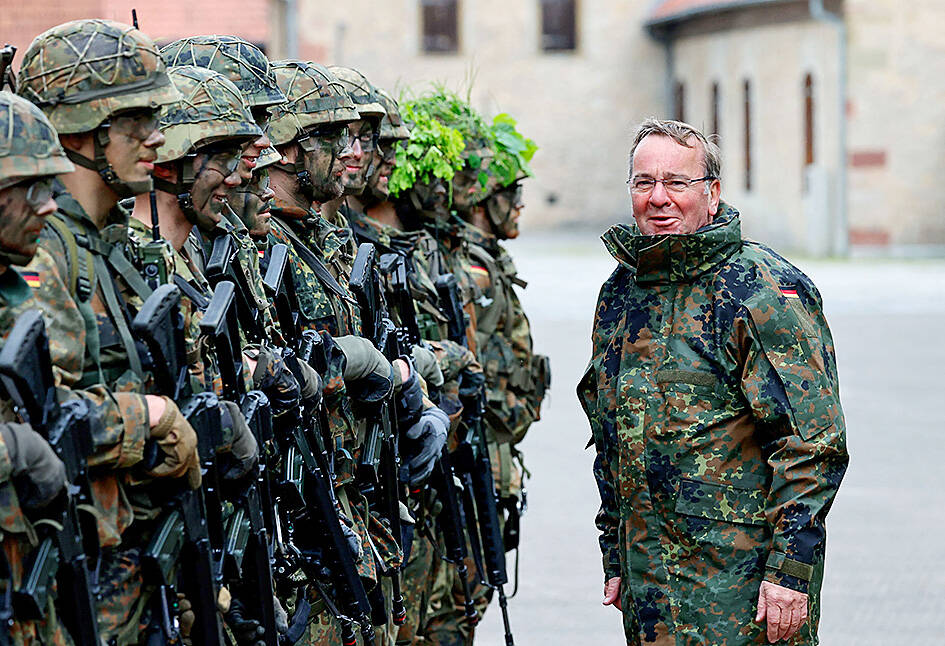Germany is, for the first time, sending troops to Australia as part of joint drills with about 30,000 service members from 12 other nations, underlining Berlin’s increased focus on the Indo-Pacific region amid rising tensions with China.
In recent years, Germany has had a greater military presence in the Indo-Pacific region, even as this means walking a tightrope between its security and economic interests.
“It is a region of extremely high importance for us in Germany. as well as for the European Union due to the economic interdependencies,” German Army Chief Lieutenant General Alfons Mais said in an interview published yesterday, hours before the first German troops were to leave for Australia.

Photo: Reuters
China is Berlin’s most important trading partner, and 40 percent of Europe’s foreign trade flows through the South China Sea, a waterway that is a focal point for territorial disputes in the Indo-Pacific region.
In 2021, a German warship sailed into the South China Sea for the first time in almost 20 years. Last year, Berlin sent 13 military aircraft to joint exercises in Australia, the air force’s largest peacetime deployment.
Mais said up to 240 German soldiers, among them 170 paratroopers and 40 marines, are to take part in the Talisman Sabre exercise from Saturday next week to Aug. 4, the largest drills between Australia and the US, which are held biannually.
The Germans are to train in jungle warfare and landing operations alongside soldiers from countries such as Indonesia, Japan, South Korea, France and Britain.
“We aim to demonstrate that we are reliable and capable partners that contribute to stabilizing the rules-based order in the region,” Mais said.
When asked what message the first deployment of German troops to Australia was meant to send to China, he said Berlin did not aim to antagonize anybody.
“It generally makes sense to get to know the perspective others have upon the world,” he said, adding that the current security challenges were much less clear-cut than before 1990.
“The Cold War was easy, it was a bipolar world. Today, we can no longer focus on Europe only... We have to position ourselves much more broadly,” he said.
Mais plans to visit the German troops in Australia and a Rheinmetall plant assembling Boxer armored transport vehicles for both armies in the middle of this month, before going on to Japan and Singapore.
“Japan is a partner that holds a lot of potential for a deepening of our bilateral military cooperation,” he said.
As for Talisman Sabre, the German troops already have orders to return to Australia for the next exercise in 2025.

People can preregister to receive their NT$10,000 (US$325) cash distributed from the central government on Nov. 5 after President William Lai (賴清德) yesterday signed the Special Budget for Strengthening Economic, Social and National Security Resilience, the Executive Yuan told a news conference last night. The special budget, passed by the Legislative Yuan on Friday last week with a cash handout budget of NT$236 billion, was officially submitted to the Executive Yuan and the Presidential Office yesterday afternoon. People can register through the official Web site at https://10000.gov.tw to have the funds deposited into their bank accounts, withdraw the funds at automated teller

PEACE AND STABILITY: Maintaining the cross-strait ‘status quo’ has long been the government’s position, the Ministry of Foreign Affairs said Taiwan is committed to maintaining the cross-strait “status quo” and seeks no escalation of tensions, the Ministry of Foreign Affairs (MOFA) said yesterday, rebutting a Time magazine opinion piece that described President William Lai (賴清德) as a “reckless leader.” The article, titled “The US Must Beware of Taiwan’s Reckless Leader,” was written by Lyle Goldstein, director of the Asia Program at the Washington-based Defense Priorities think tank. Goldstein wrote that Taiwan is “the world’s most dangerous flashpoint” amid ongoing conflicts in the Middle East and Russia’s invasion of Ukraine. He said that the situation in the Taiwan Strait has become less stable

CONCESSION: A Shin Kong official said that the firm was ‘willing to contribute’ to the nation, as the move would enable Nvidia Crop to build its headquarters in Taiwan Shin Kong Life Insurance Co (新光人壽) yesterday said it would relinquish land-use rights, or known as surface rights, for two plots in Taipei’s Beitou District (北投), paving the way for Nvidia Corp to expand its office footprint in Taiwan. The insurer said it made the decision “in the interest of the nation’s greater good” and would not seek compensation from taxpayers for potential future losses, calling the move a gesture to resolve a months-long impasse among the insurer, the Taipei City Government and the US chip giant. “The decision was made on the condition that the Taipei City Government reimburses the related

FRESH LOOK: A committee would gather expert and public input on the themes and visual motifs that would appear on the notes, the central bank governor said The central bank has launched a comprehensive redesign of New Taiwan dollar banknotes to enhance anti-counterfeiting measures, improve accessibility and align the bills with global sustainability standards, Governor Yang Chin-long (楊金龍) told a meeting of the legislature’s Finance Committee yesterday. The overhaul would affect all five denominations — NT$100, NT$200, NT$500, NT$1,000 and NT$2,000 notes — but not coins, Yang said. It would be the first major update to the banknotes in 24 years, as the current series, introduced in 2001, has remained in circulation amid rapid advances in printing technology and security standards. “Updating the notes is essential to safeguard the integrity